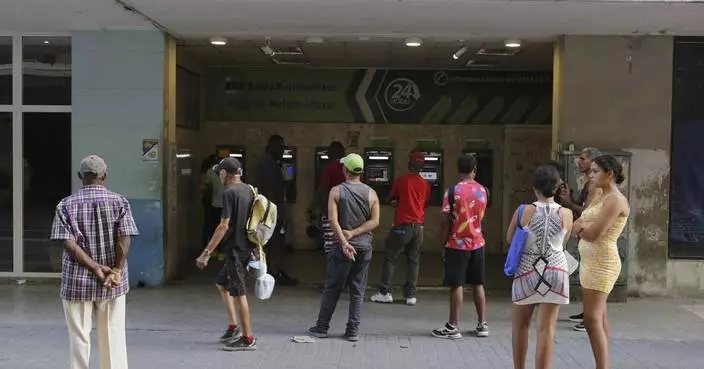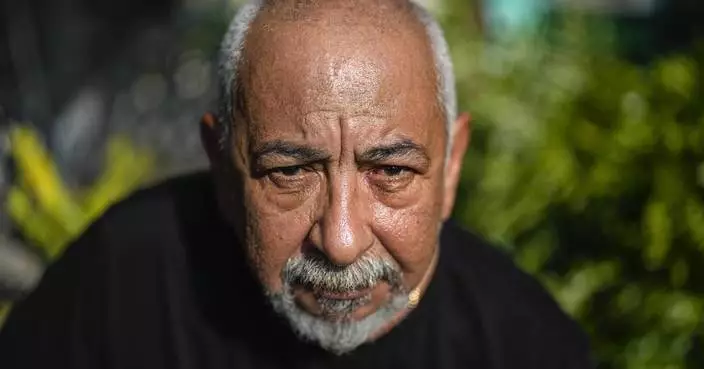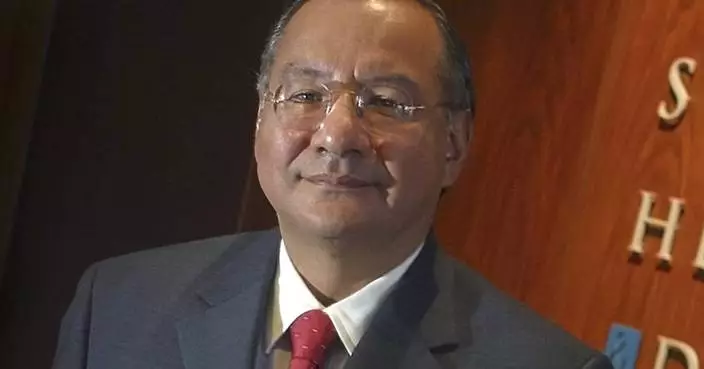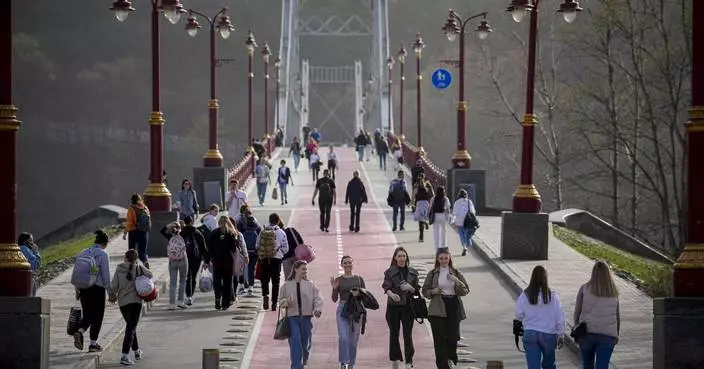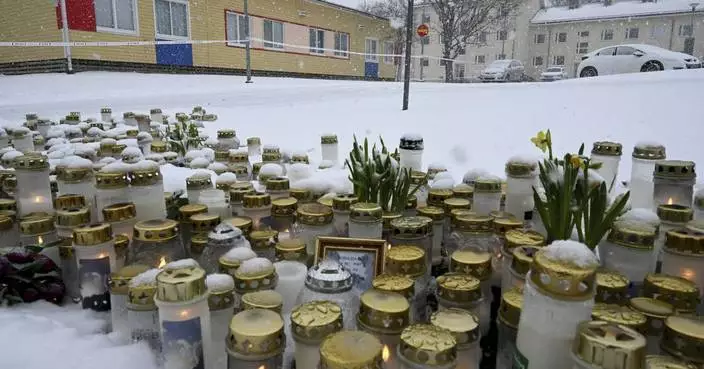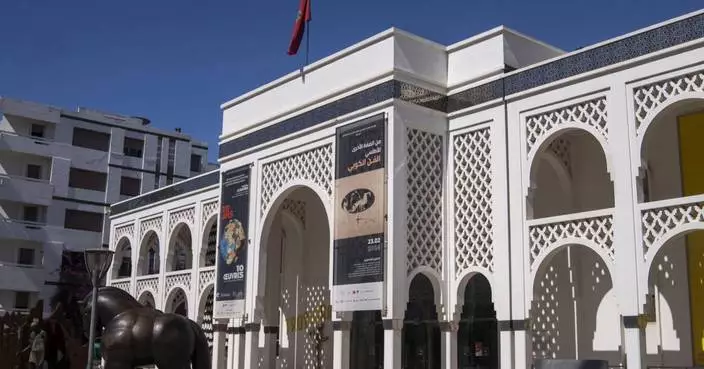Irma collapsed buildings and battered Cuba with deafening winds and relentless rain Saturday, while a second hurricane, Jose, threatened to lash already-reeling islands elsewhere in the Caribbean.
Across a swath of Cuba, utility poles were toppled, trees uprooted and roads blocked. Witnesses said a provincial museum near the eye of the storm was in ruins. And authorities in the city of Santa Clara said 39 buildings collapsed.
Click to Gallery
Irma collapsed buildings and battered Cuba with deafening winds and relentless rain Saturday, while a second hurricane, Jose, threatened to lash already-reeling islands elsewhere in the Caribbean.
There were no immediate reports of casualties in Cuba in addition to the 22 dead left in Irma's wake across the Caribbean, where the storm ravaged such lush resort islands as St. Martin, St. Barts, St. Thomas, Barbuda and Anguilla.
Carol Basch, a 53-year-old tourist from Savannah, Georgia, took refuge during the storm in the bathroom of her St. Martin hotel room after windows shattered. She stayed there praying for about four hours, surrounding herself with pillows.
Video images from northern and eastern Cuba showed uprooted utility poles and signs, many downed trees and extensive damage to roofs.
Looting was reported on St. Martin. Curfews were imposed there and on St. Barts, and French and Dutch authorities announced plans to send hundreds more troops and police to keep order.
On Anguilla, Vanessa Croft Thompson crammed into her home's laundry room with her husband, her best friend and their children along with their cats and dogs, as Irma's floodwaters swamped her house. The storm peeled off her roof, rained water inside, and sheared paint from her walls.

A woman and child use a blanket as protection from wind and rain as they walk in Caibarien, Cuba, Friday, Sept. 8, 2017. (AP Photo/Desmond Boylan)
There were no immediate reports of casualties in Cuba in addition to the 22 dead left in Irma's wake across the Caribbean, where the storm ravaged such lush resort islands as St. Martin, St. Barts, St. Thomas, Barbuda and Anguilla.
Many of Irma's victims fled their battered islands on ferries and fishing boats for fear Jose would destroy or drench anything Irma left untouched.
On the Dutch side of St. Martin, an island divided between French and Dutch control, an estimated 70 percent of the homes were destroyed by Irma, according to the Dutch government. Officials said Jose was forecast to dump more rain on the island's buildings, many of which lost their roofs to Irma.
The U.S. State Department helped more than 500 Americans fly out of St. Martin, starting with those in need of urgent medical care, said spokeswoman Heather Nauert.

Residents walk near downed power lines felled by Hurricane Irma, in Caibarien, Cuba, Saturday, Sept. 9, 2017. (AP Photo/Desmond Boylan)
Carol Basch, a 53-year-old tourist from Savannah, Georgia, took refuge during the storm in the bathroom of her St. Martin hotel room after windows shattered. She stayed there praying for about four hours, surrounding herself with pillows.
"I kept saying, 'Lord, please stop this, and soon, soon,'" said Basch, who was evacuated to Puerto Rico. "I'm glad I'm alive. I didn't think I was going to make it."
Some islands received a last-minute reprieve from Jose as it passed by.
The U.S. National Hurricane Center downgraded a hurricane warning for Barbuda and Anguilla. A hurricane watch also was discontinued for nearby Antigua.
By late Saturday afternoon, Irma passed Cuba and slowly chugged toward Florida with winds of 125 mph (205 kmh). Jose was 85 miles (135 kilometers) northeast of the Leeward Islands, with winds of 145 mph (230 kmh).
As Irma rolled in, Cuban soldiers went through coastal towns to force people to evacuate, taking people to shelters at government buildings and schools — and even caves.

A tree felled by Hurricane Irma blocks a road in Caibarien, Cuba, Saturday, Sept. 9, 2017. (AP Photo/Desmond Boylan)
Video images from northern and eastern Cuba showed uprooted utility poles and signs, many downed trees and extensive damage to roofs.
Eastern Cuba, a major sugarcane-growing area and home to many poor, rural communities, faced a staggering recovery, with its economy in tatters even before the storm hit due to years of neglect and lack of investment.
Civil Defense official Gergorio Torres said authorities were trying to tally the extent of the damage, which appeared concentrated in banana-growing areas.
More than 5,000 tourists were evacuated from the keys off Cuba's north-central coast, where the government has built dozens of all-inclusive resorts in recent years.
In Caibarien, a small coastal city about 200 miles (320 kilometers) east of Havana, winds downed power lines and a three-block area was under water. Many residents stayed put, hoping to ride out the storm.

Residents ride their bikes through flood waters in the aftermath of Hurricane Irma, in Caibarien, Cuba, Saturday, Sept. 9, 2017. (AP Photo/Desmond Boylan)
Looting was reported on St. Martin. Curfews were imposed there and on St. Barts, and French and Dutch authorities announced plans to send hundreds more troops and police to keep order.
French President Emmanuel Macron, whose popularity has been sinking over unpopular domestic policies, held an emergency meeting as he came under criticism from stranded residents in the country's Caribbean territories. Far-right leader Marine Le Pen, who lost the presidential election in May, accused the government of having "totally insufficient" emergency and security measures.
French Prime Minister Edouard Philippe insisted that the government's support for Irma's victims isn't "empty words" and that it was "completely mobilized" to rescue and rebuild.
It was not immediately known whether U.S. President Donald Trump's luxury property on St. Martin had been damaged.

This photo provided by Caribbean Buzz shows the destruction left in the wake of Hurricane Irma Friday, Sept. 8, 2017, in the U.S. Virgin Islands The death toll from Hurricane Irma has risen to 22 as the storm continues its destructive path through the Caribbean. (Caribbean Buzz via AP)
On Anguilla, Vanessa Croft Thompson crammed into her home's laundry room with her husband, her best friend and their children along with their cats and dogs, as Irma's floodwaters swamped her house. The storm peeled off her roof, rained water inside, and sheared paint from her walls.
"Our hurricane-proof door was bending in, it was warping ... and the entire house was shaking like it was an earthquake," she said.
Thompson, the head of the English department at Anguilla's only high school, said: "I don't even know something that's not destroyed. There's nothing here that hasn't been ripped apart by Irma."
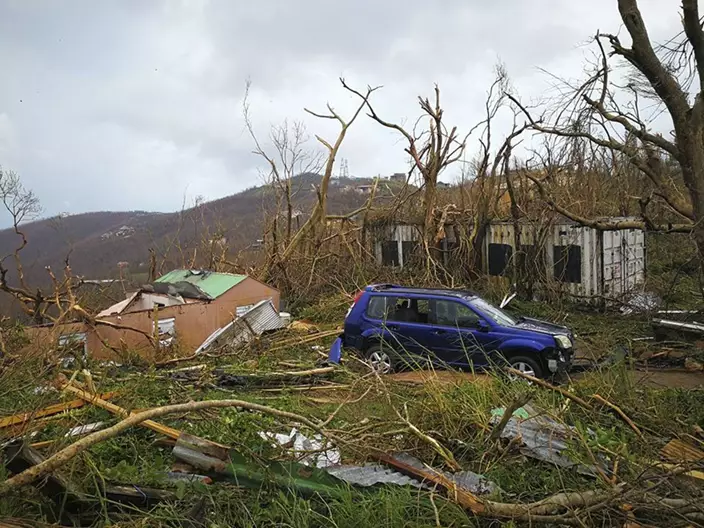
This Thursday, Sept. 7, 2017 photo shows storm damage in the aftermath of Hurricane Irma in Tortola, in the British Virgin Islands. (Jalon Manson Shortte via AP)
CAPE TOWN, South Africa (AP) — South Africans celebrate their “Freedom Day” every April 27, when they remember their country's pivotal first democratic election in 1994 that announced the official end of the racial segregation and oppression of apartheid.
Saturday is the 30th anniversary of that momentous vote, when millions of Black South Africans, young and old, decided their own futures for the first time, a fundamental right they had been denied by a white minority government.
The first all-race election saw the previously banned African National Congress party win overwhelmingly and made its leader, Nelson Mandela, the country's first Black president four years after he was released from prison.
Here's what you need to know about that iconic moment and a South Africa that's changing again 30 years on:
The 1994 election was the culmination of a process that began four years earlier when F.W. de Klerk, the last apartheid-era president, shocked the world and his country by announcing that the ANC and other anti-apartheid parties would be unbanned.
Mandela, the face of the anti-apartheid movement, was released from prison nine days later, setting him on the road to becoming South Africa's first Black leader.
South Africa needed years to prepare and was still on a knife-edge in the months and weeks before the election because of ongoing political violence, but the vote — held over four days between April 26 and April 29 to accommodate the large numbers who turned out — went ahead successfully.
A country that had been shunned and sanctioned by the international community for decades because of apartheid emerged as a fully-fledged democracy.
Nearly 20 million South Africans of all races voted, compared with just 3 million white people in the last general election under apartheid in 1989.
Associated Press photographer Denis Farrell's iconic aerial photograph of people waiting patiently for hours in long, snaking queues in fields next to a school in the famed Johannesburg township of Soweto captured the determination of millions of Black South Africans to finally be counted. It was nominated for a Pulitzer Prize.
“South Africa’s heroes are legend across the generations,” Mandela said as he proclaimed victory. “But it is you, the people, who are our true heroes.”
The ANC's election victory ensured that apartheid was finally dismantled and a new Constitution was drawn up and became South Africa's highest law, guaranteeing equality for everyone no matter their race, religion or sexuality.
Apartheid, which began in 1948 and lasted for nearly half-a-century, had oppressed Black and other non-white people through a series of race-based laws. Not only did the laws deny them a vote, they controlled where Black people lived, where they were allowed to go on any given day, what jobs they were allowed to hold and who they were allowed to marry.
Current South African President Cyril Ramaphosa — a protege of Mandela — will lead Saturday's 30th anniversary Freedom Day celebrations at the Union Buildings in Pretoria, the seat of government.
The ANC has been in government ever since 1994 and while it is still recognized for its central role in freeing South Africans, it is no longer celebrated in the same way as it was in the hope-filled aftermath of that election.
South Africa in 2024 has deep socio-economic problems, none more jarring than the widespread and severe poverty that still overwhelmingly affects the Black majority. The official unemployment rate is 32%, the highest in the world, while it's more than 60% for young people aged 15-24.
Millions of Black South Africans still live in neglected, impoverished townships and informal settlements on the fringes of cities in what many see as a betrayal of the heroes Mandela referred to. South Africa is still rated as one of the most unequal countries in the world.
The ANC is now largely being blamed for the lack of progress in improving the lives of so many South Africans, even if the damage of decades of apartheid wasn't going to be easy to undo.
The 30th anniversary of 1994 falls with another possibly pivotal election as a backdrop. South Africa will hold its seventh national vote since the end of apartheid on May 29, with all the opinion polls and analysts predicting that the ANC will lose its parliamentary majority in a new landmark.
The ANC is still expected to be the largest party and will likely have to enter into complicated coalitions with smaller parties to remain part of the government, but the overriding picture that is expected is that more South Africans will vote for other parties in a national election for the first time in their democracy.
South Africans still cherish the memory of Mandela and the elusive freedom and prosperity he spoke about in 1994. But the majority of them now appear ready to look beyond the ANC to attain it.
AP Africa news: https://apnews.com/hub/africa

FILE — A crowd of people sing and give peace signs during a lunchtime peace march in downtown Johannesburg, South Africa, Jan. 27, 1994 ahead of the country's all race elections. South Africans celebrate "Freedom Day" every April 27, when they remember their country's pivotal first democratic elections in 1994 that announced the official end of the racial segregation and oppression of apartheid. (AP Photo/Denis Farrell/File)

FILE - Train commuters hold on to the side of an overcrowded passenger train in Soweto, South Africa. Monday, March 16, 2020. South Africans celebrate "Freedom Day" every April 27, when they remember their country's pivotal first democratic elections in 1994 that announced the official end of the racial segregation and oppression of apartheid.(AP Photo/Themba Hadebe, File)
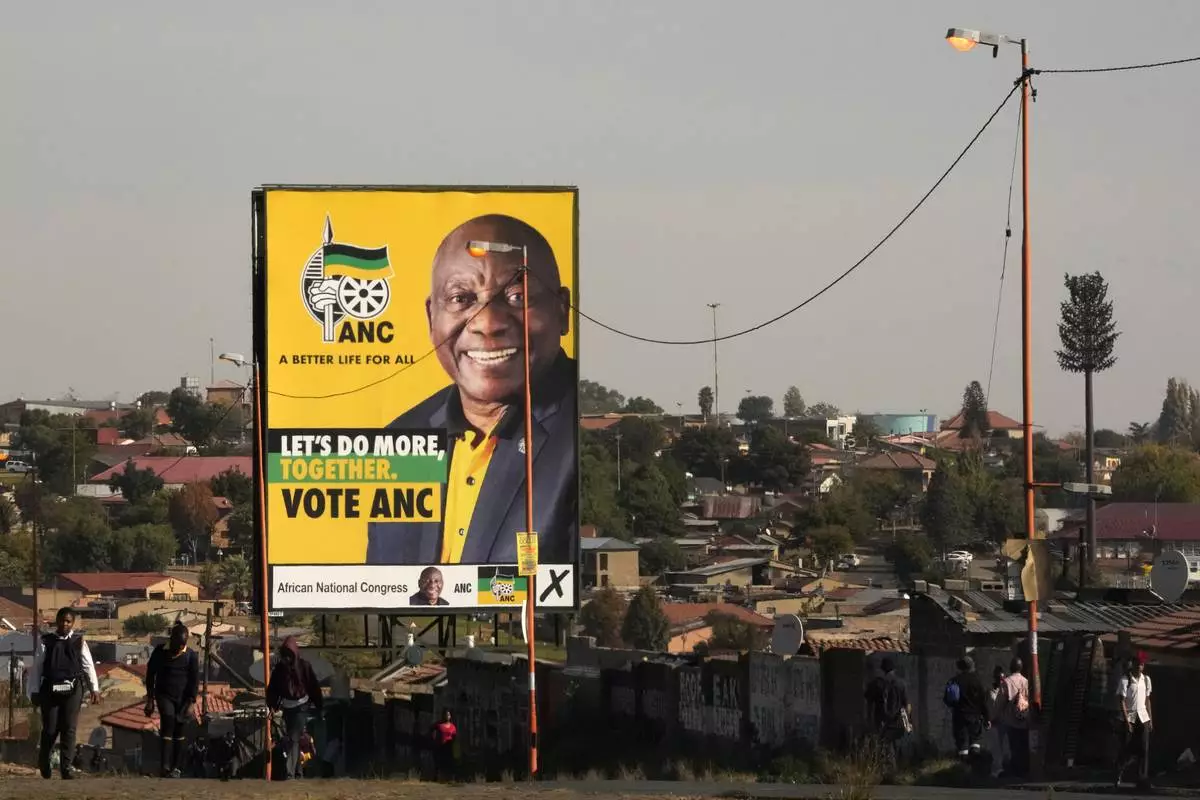
An election poster, with President Cyril Ramaphosa atop a pole in Soweto, South Africa, Monday, April 22, 2024. South Africans celebrate "Freedom Day" every April 27, when they remember their country's pivotal first democratic elections in 1994 that announced the official end of the racial segregation and oppression of apartheid. (AP Photo/Themba Hadebe)
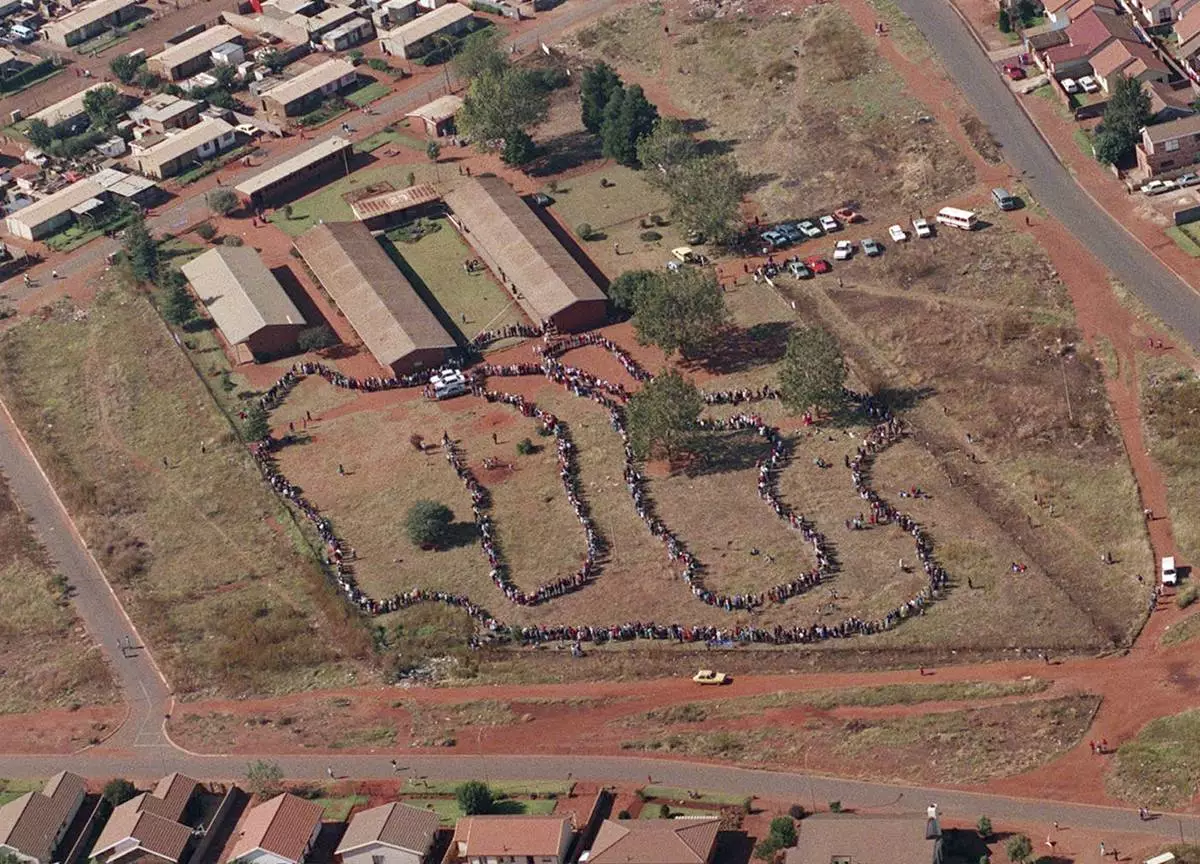
FILE - People queue to cast their votes In Soweto, South Africa April 27, 1994, in the country's first all-race elections. South Africans celebrate "Freedom Day" every April 27, when they remember their country's pivotal first democratic elections in 1994 that announced the official end of the racial segregation and oppression of apartheid. (AP Photo/Denis Farrell. File)

FILE — Nelson Mandela addresses supporters during victory celebrations in Johannesburg as he and the African National Congress are set to take power following the country's first racially integrated election, May 2, 1994. South Africans celebrate "Freedom Day" every April 27, when they remember their country's pivotal first democratic elections in 1994 that announced the official end of the racial segregation and oppression of apartheid. (AP Photo/Peter Delong/File)
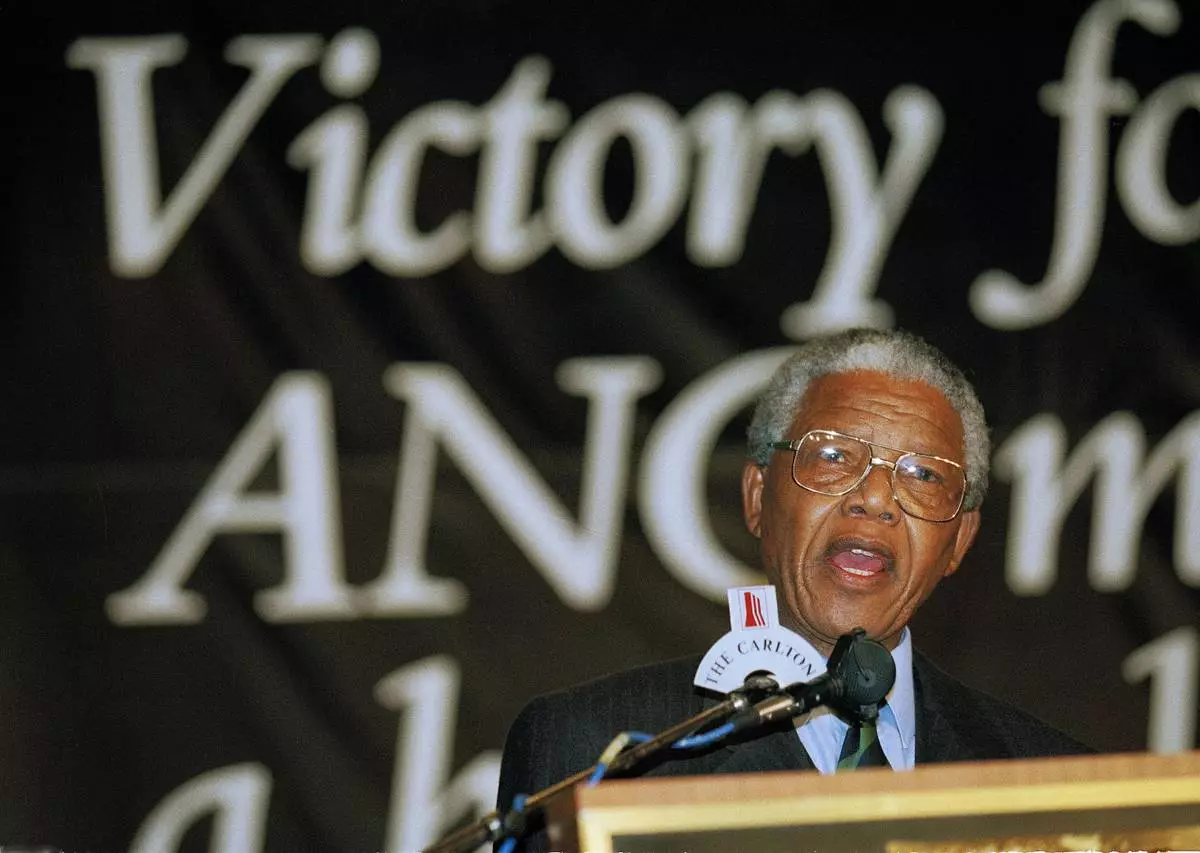
FILE — Nelson Mandela addresses supporters during victory celebrations in Johannesburg as he and the African National Congress are set to take power following the country's first racially integrated election, May 2, 1994. South Africans celebrate "Freedom Day" every April 27, when they remember their country's pivotal first democratic elections in 1994 that announced the official end of the racial segregation and oppression of apartheid. (AP Photo/John Parkin)
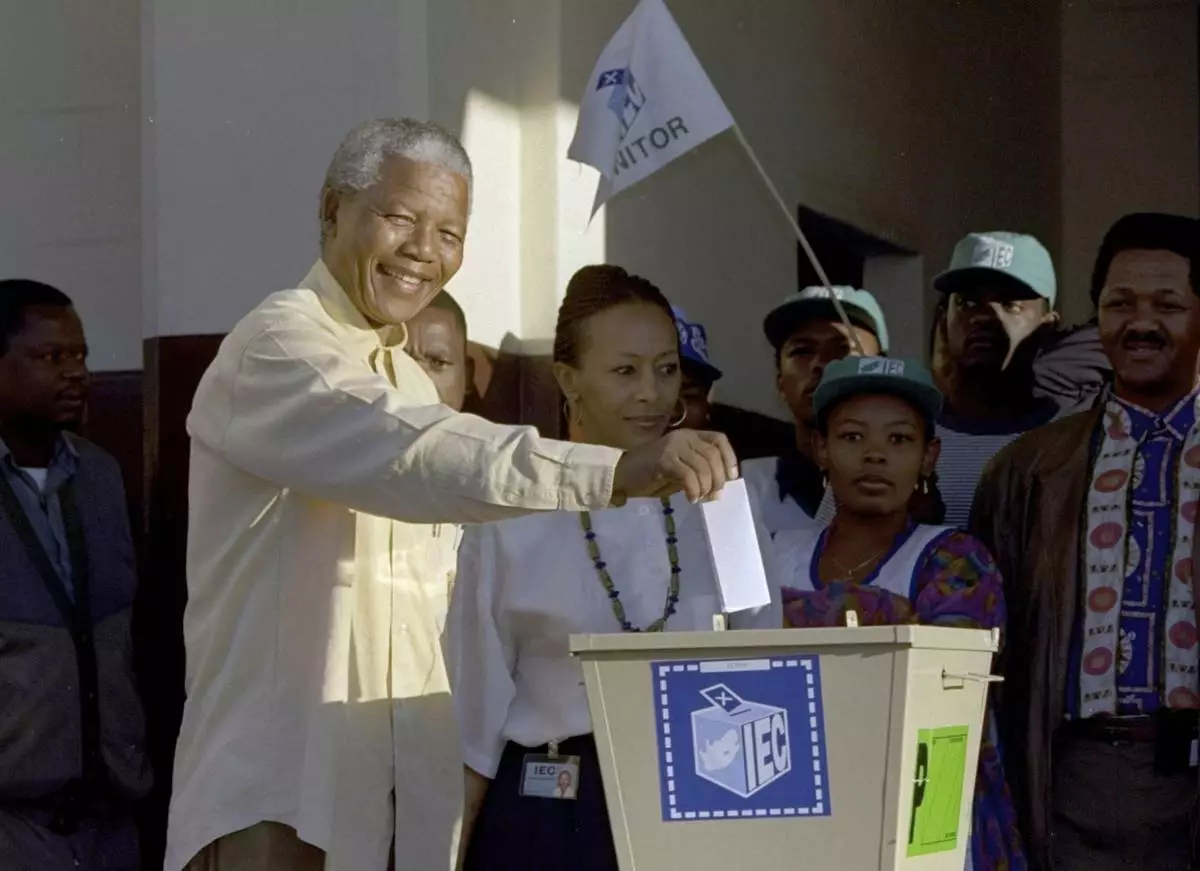
FILE - Then African National Congress leader, Nelson Mandela casts his vote April 27, 1994 near Durban, South Africa, in the country's first all-race elections. South Africans celebrate "Freedom Day" every April 27, when they remember their country's pivotal first democratic elections in 1994 that announced the official end of the racial segregation and oppression of apartheid. (AP Photo/John Parkin. File)

FILE - People queue to cast their votes In Soweto, South Africa April 27, 1994, in the country's first all-race elections. South Africans celebrate "Freedom Day" every April 27, when they remember their country's pivotal first democratic elections in 1994 that announced the official end of the racial segregation and oppression of apartheid. (AP Photo/Denis Farrell. File)

















